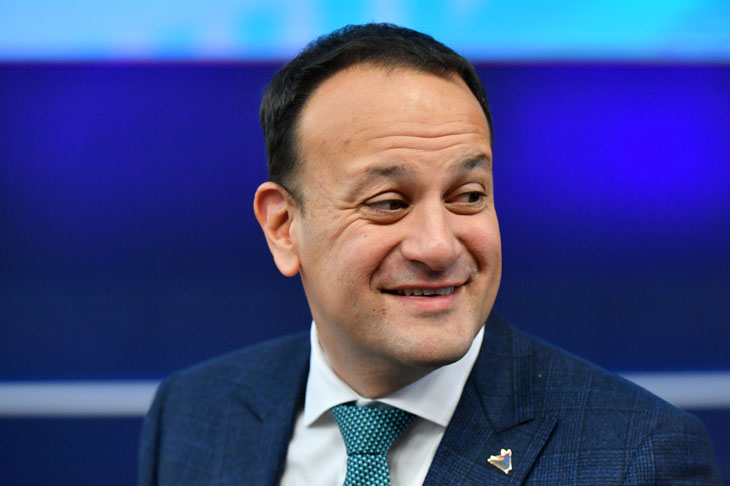We may or may not hear news soon of a settlement of the Irish border issue that will allow Brexit to proceed without the calamity of ‘no deal’. Word this week was that Irish taoiseach Leo Varadkar might offer a compromise ‘review mechanism’ for the ‘backstop’ which might otherwise leave the UK locked in a customs union — but like me, you’re probably none the wiser as to what that actually means.
History will judge this episode as a disgraceful example of politicians bluffing in the face of tough choices rather than explaining complexities or acknowledging hard facts — set out, in this case, in a Northern Ireland Affairs select committee report in March 2018 that said, among many other interesting things, ‘we have had no visibility of any technical solutions, anywhere in the world, beyond the aspirational, that would remove the need for physical infrastructure at the border’.
History might also say Varadkar was justified in his stubborn position that Ireland wasn’t going to help design a border it did not want; that Michel Barnier, as a former EU regional policy commissioner, understood the issue and its history far better than he let on, and should have been more pragmatic; but that British ministers were the most culpable, for pretending the obvious sticking-point of the whole negotiation was a sideshow that could be solved with the wave of a technological wand. It could not; and whatever the outcome, the damage to cross-border economic co-operation and investment will, I fear, be immense.
Admiral of the Barclays fleet
Now that I’m older than everyone at the top of the tree, from the Archbishop of Canterbury to the Lord Chief Justice, I’ve given up trying to pitch myself for the chairmanship of Barclays. But I’m still fascinated by the psychopathology of the bank where I once worked, so I can’t help wondering how the new man named for the job, veteran Roths-child banker Nigel Higgins, will shape up.
My sources say Higgins is a whip-smart financier of the sort blue-chip corporate clients are always glad to have on their side. His claim to fame is that in 2010 he became the first non-family chief executive of Roths-child — under the close eye of the firm’s patriarch Baron David de Rothschild, whose son Alexandre was too young to take the reins. Barclays is a very different proposition, and there’s a precedent that does not bode well: Marcus Agius, chairman from 2006 to 2012, was previously a Lazard banker much praised by blue-chip clients — but was widely judged to have failed to exercise boardroom authority during the financial crisis, leaving Bob Diamond to hold sway with all sorts of unfortunate consequences.
Like all the big banks, Barclays claims to have moved on. But despite improving profits, its share price still drifts at barely a quarter of its pre-2008 peak while shareholders, led by activist Edward Bramson with a 5 per cent stake, cast doubt on the investment banking ambitions of accident-prone chief executive Jes Staley; and a high-profile fraud trial of former Barclays executives looms. Captaining the sleek financial super-yacht that is the house of Rothschild on behalf of its dynastic owners is not obvious training for the role of admiral of the fractious, battle-weary Barclays fleet.
Disrupting the NHS
The Spectator’s Economic Disruptor of the Year Awards, whose winners are saluted on page 26, has reinforced my esteem for entrepreneurs who pursue bright ideas despite all obstacles, whether in the form of regulatory mazes, market-dominant cartels or impenetrable bureaucracy. In the latter category, I was particularly impressed by numerous entrants who are striving, in a positive way, to disrupt the NHS. If none was on our winners’ list it was only because it was too hard to judge which are making the most impact in improving the patient experience.
But there can be no worthier sphere of enterprise, so let me add some honourable mentions as a postscript to the Awards results. Black Pear Software, founded by former GP David Jehring, uses cloud technology to improve NHS information-sharing and direct patients to the right point of care. Echo, founded by Stephen Bourke, has the simpler aim of streamlining the tiresome process of obtaining repeat prescriptions. And Surfaceskins, founded by Brian Waligora, offers germ-killing push-pads for hospital and surgery doors that promise radically to reduce the spread of infection. We admired you all: keep up the good work.
Ashley marches on
I dreamed I saw a monster advancing through a devastated town centre, mighty footsteps shaking semi-derelict buildings. I awoke in my armchair to find I had been reading a news item about Sports Direct tycoon Mike Ashley’s latest gambit: buying the 60-shop Evans Cycles chain out of administration for just £8 million, to follow his swoop on House of Fraser’s tottering department stores group in August. Say what you like about Ashley’s ruthless opportunism — he’s already said himself that half the Evans outlets will have to close — he’s the only big beast out there who’s on a mission to keep bricks-and-mortar retailing alive.
But in this era of cycling mania, why isn’t the 97-year-old, well-recognised Evans brand enjoying a golden era, rather than gasping in intensive care? Perhaps it has suffered the curse of private equity, ownership having passed through two sets of financiers’ hands in the past decade. There’s certainly no lack of demand for what it offers: I’ve often observed that (like Apple retailers and repairers) bicycle workshops are absurdly hard to find in most parts of Britain. During my own brief love affair with long distance cycling in the 1990s, I even thought of opening one in my Yorkshire hometown of Helmsley. Someone should develop a pop-up, low-cost bike-shop franchise, easy to adapt to disused high-street sites, and enter it for next year’s Disruptor Awards.







Comments